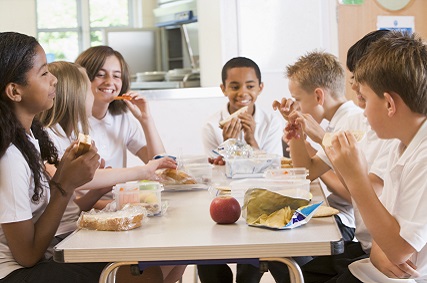
Fall 2020
The Impact of COVID-19 on School Nutrition Research: Barriers and Opportunities for Science-Informed Policy
Elizabeth Adams, PhD✉; Melanie Bean, PhD✉; Joanna Buscemi, PhD✉; Child and Family Health SIG

The National School Lunch Program (NSLP) and School Breakfast Program (SBP) provide essential nutrition to >30 million children daily. School closures due to COVID-19 have severely disrupted these programs, raising concerns for food insecurity, poorer nutritional intake, and widening health inequities.1,2 COVID-19 has also halted ongoing school nutrition research, creating barriers for empirical data to inform school food policy.
Rigorous scientific evidence is critically needed to inform policy decisions related to child nutrition programs. The current administration has already rolled-back some of the healthier NSLP and SBP guidelines mandated under the Healthy, Hunger-Free Kids Act (HHFKA),3 citing school nutrition programs’ inability to adhere to these (healthier) standards and increased plate waste, among others, lowering the nutrition standard for millions of children. However, these claims are anecdotal and inconsistent with available data.4 Several ongoing investigations were well-poised to provide additional rigorous scientific data to policymakers to help them make evidence-based decisions related to school nutrition programs. For example, via a large scale randomized controlled trial, Dr. Melanie Bean (PI), Child and Family Health Special Interest Group (SIG) Co-Chair and member of the Health Policy Council, is using digital imagery plate waste to evaluate the impact of salad bars on students’ fruit, vegetable, and energy intake (R01HD098732). Dr. Joanna Buscemi, Child and Family SIG member and Chair of the Health Policy Council was leading a mixed-methods study in Chicago Public Schools to assess high school student and caregiver predictors of participation in the NSLP across 5 schools serving systemically oppressed populations. Active data collection is paused for both studies due to school closures with no real timeline for when the projects will be able to resume.
If we, and others, are unable to fully execute these school-based investigations, then scientific evidence available to policymakers will be limited. The Child Nutrition Reauthorization Act, which included the HHFKA, has not been reauthorized since 2010. Discussions were underway to pass the Reauthorization Act when COVID-19 occurred, but Congress refocused its efforts to pandemic relief. While the NSLP and SBP continue to operate through annual appropriations, the Reauthorization Act provides an opportunity to improve and strengthen these programs based on the latest scientific evidence. Consequently, in the absence of new evidence, other factors (e.g., cost) and entities (e.g., lobbyists, food industries) might carry a greater weight in driving forthcoming policy changes to the NSLP and SBP.
Despite barriers to conducting nutrition research in schools, the pandemic may require that Society of Behavioral Medicine (SBM) members quickly pivot to evaluate COVID-19 related changes to the NSLP (e.g., waivers and meal distribution methods) and examine their impact on children’s dietary intake and food security. Indeed, child nutrition is an SBM policy priority area for the next 3 years, highlighting the need for members to continue to champion these issues in our current context in both their research and advocacy efforts. With >30 million children relying on school meals, high nutrition standards are of paramount importance to optimize the dietary intake of the most vulnerable youth.
References
- Fleischhacker S, Campbell E. Ensuring equitable access to school meals. J Acad Nutr Diet. 2020;120(5):893-897.
- Dunn CG, Kenney E, Fleischhacker SE, Bleich SN. Feeding low-income children during the COVID-19 pandemic. New Eng J Med. 2020;382:e40.
- Healthy Hunger-Free Kids Act of 2010. One Hundred Eleventh Congress of the United States of America, 2nd Session. S. 2010:3307.
- Buscemi J, Odoms-Young A, Yaroch AL, et al. Retain school meal standards and healthy school lunches. Society of Behavioral Medicine Position Statement. January 2018. https://www.sbm.org/UserFiles/file/SBMpolicybrief_SchoolLunchStandards.pdf